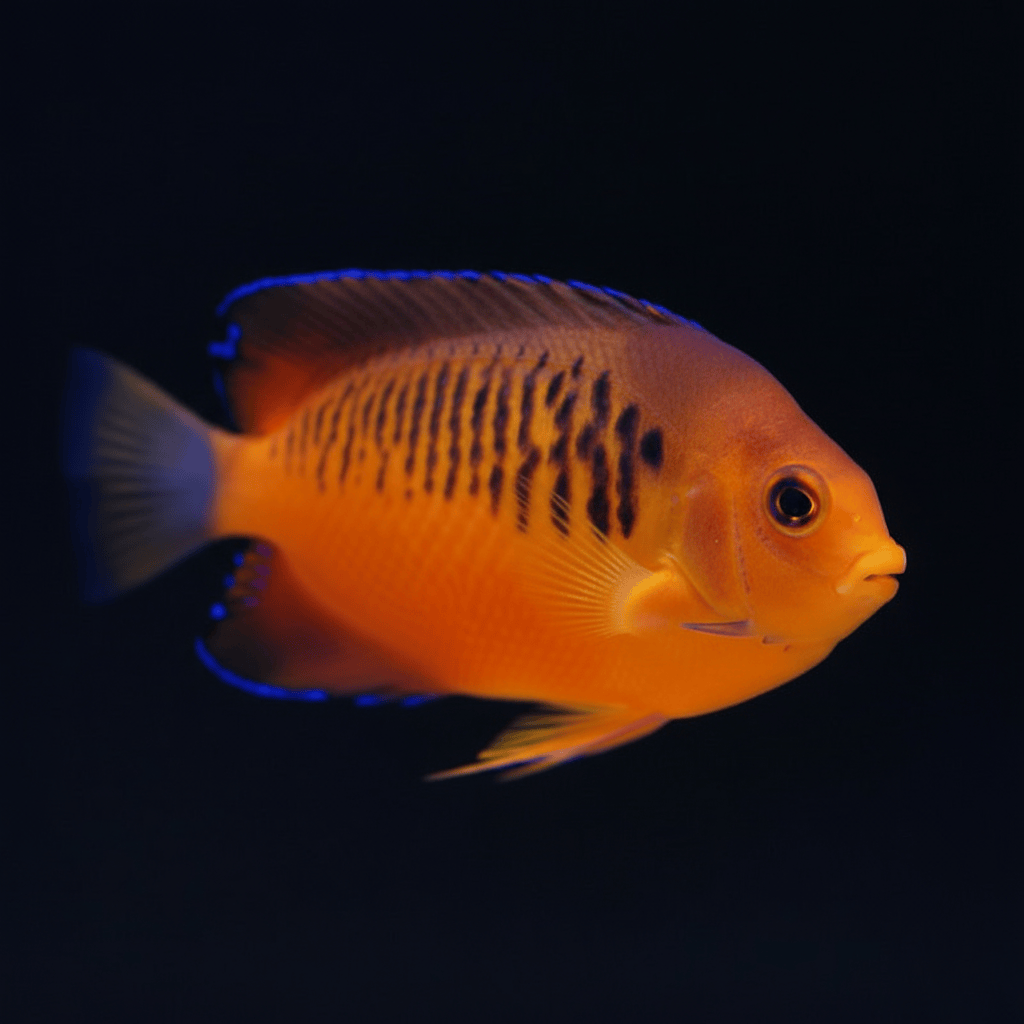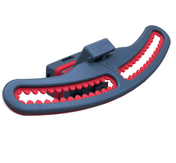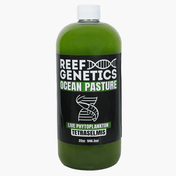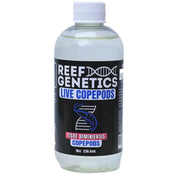Approx. Size: 2-3 Inches
Shepardi Dwarf Angelfish (Centropyge shepardi)
The Shepardi Dwarf Angelfish is a stunning species, known for its striking coloration and smaller size, making it a favorite in the marine aquarium hobby. Its body displays an appealing combination of vibrant yellow and orange hues with a dark blue or blackish backdrop, creating a bold contrast that captures attention. This angelfish is not only beautiful but also hardy, adapting well to home aquariums if provided the right care.
Tank Requirements
Shepardi Dwarf Angelfish thrive in tanks of at least 30 gallons, with a well-established rock structure that provides plenty of hiding spots and grazing opportunities. Like most dwarf angelfish, they appreciate a mature and stable system with stable water parameters. The tank should have plenty of live rock to mimic their natural environment, offering both refuge and foraging grounds.
Algae Grazers and Foragers
As opportunistic omnivores, Shepardi Angelfish spend a good amount of time picking at live rock and sand to graze on algae, detritus, and small invertebrates. While they do contribute to controlling algae growth, they should not be relied upon solely for algae control. Their natural foraging helps maintain the health of the tank's ecosystem by removing excess detritus.
Diet and Feeding
The Shepardi Dwarf Angelfish requires a well-balanced, varied diet to maintain its vibrant colors and overall health. Offer high-quality marine pellets, algae-based flakes, spirulina, and frozen foods such as brine shrimp or mysis shrimp. It is also important to supplement with dried algae or nori to satisfy their grazing instincts. Feed 2-3 times a day to support their activity levels and health.
Tankmates and Behavior
Shepardi Dwarf Angelfish are generally peaceful but can show signs of territorial behavior, especially towards other dwarf angelfish or similarly sized species. In a community tank, they are usually compatible with most non-aggressive fish, though caution should be used when introducing other angelfish. They are considered reef-safe with some caution—while most individuals leave corals unharmed, some may nip at soft or fleshy corals, particularly if they are not adequately fed.
At Top Shelf Aquatics, we take pride in ensuring your order arrives safely and in perfect condition. Here’s everything you need to know about our shipping process:
Livestock Shipping Details
- Flat Rate Shipping:
- $39.99 Out of State
- $34.99 Florida (In-State)
- Orders over $299 ship FREE!
- NO FREE Shipping during Sale Events
- Shipping Days: The calendar during checkout determines when your livestock order will arrive. Normally we ship Monday - Thursday via FedEx Priority Overnight.
Orders placed by 2 PM EST Monday - Thursday ship the same day. Orders placed after 2 PM or on Fridays will ship the next business day. - Delivery Times: Most packages arrive by 10:30 AM EST, though remote areas may experience later deliveries.
We take every measure to protect your livestock, including specialized packaging to maintain temperature and safety during transit.
Dead on Arrival (DOA) Policy
In the rare event of a DOA, you must submit a DOA Request within 2 hours of delivery (FedEx posted time). Once submitted, we will issue a replacement or store credit for the livestock. Please note:
- Shipping costs are not included in the credit.
- Refunds are not offered for livestock or shipping.
While we cannot be held responsible for delays caused by mechanical or weather issues, rest assured we’ll do everything possible to make it right!
Reef Guard Protection Plan
For ultimate peace of mind, upgrade to our Reef Guard Protection Plan. With Reef Guard, you’ll enjoy:
- Extended Livestock Guarantee: Coverage for up to 5 days.
- Priority Resolutions: Hassle-free claims with fast resolutions.
- Weather & Shipping Delay Coverage: Includes FedEx lost packages and damages.
Shipping Restrictions
- We currently ship livestock only within the continental U.S.
- Note: Due to Hawaii state law, we are unable to ship corals to Hawaii.
Now’s the perfect time to prepare your aquarium for its new additions. Consider doing a water change and ensuring space is ready. Check out our YouTube channel for detailed care instructions for your new corals!
For any questions or concerns, feel free to reach out to our support team. We’re here to help make your reefing journey a success!
5 Day Reef Guard
Temp-Control Box
Priority Overnight
Expert Care Support



















